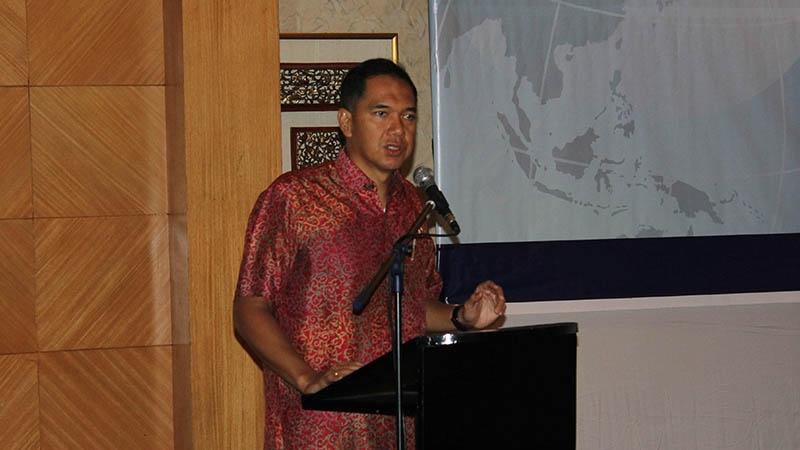The Distinguished Lecture Series discusses "ASEAN in 2015: Engendering ASEAN's Services Value Chains"
Date:
18 March 2013Category:
Press ReleasesShare Article:
Print Article:
Jakarta, March 18, 2013 - To provide a platform for knowledge transfer and substantial discussions among government officials, academia, and public and private sector leaders, the Economic Research Institute for ASEAN and East Asia (ERIA) and the UPH (Universitas Pelita Harapan) organized the 2nd Distinguished Lecture Series Seminar "ASEAN in 2015: Engendering ASEAN's Services Value Chains" in Jakarta.
H.E. Gita Wirjawan, Minister of Trade of the Republic of Indonesia was the keynote speaker of the seminar. He commended the organizers for the seminar because the theme is timely and important; for example services sector contributes 50% of the Indonesia's GDP. Services will also be a major issue in the negotiations under the Regional Comprehensive Economic Partnership (RCEP). RCEP economies account for US $ 20 trillion GDP at present. He emphasized the need for the language of trade which should be understood by as many people as possible. He also reiterated the importance of mutuality and fairness of trade in the negotiations.
H.E Wirjawan highlighted the success of Indonesia in attracting investments in recent years, which are increasingly outside of mining, including the service sector. He projected that Indonesia would be a US$ 6 - 7 trillion economy in 20 years which means around US $ 60 trillion cumulated income over the 20 years. This implies around US $ 2.4 trillion expenditures in education during the same period, an important element of competitiveness in service chains.
After opening by Mr. Henry Soelistyo Budi, Head of Master of Law and Doctor of Law Program, the seminar had two lecture sessions: first session "Global Value Chains in Services" and second session "Investing in the ASEAN Services Sector". Around 100 participants attended the event. Prof. Pierre Sauv�, Director of External Programs and Academic Partnerships World Trade Institute, University of Bern, Switzerland, made presentation in the first session. Prof. Sauv� highlighted the dual aspects of services: intermediates for manufacturing and final products.
In addition to services as intermediate to manufacturing (e.g., logistics), he emphasized that the merging value chains of services which is enabled by the development of information technology. If the right policies are taken in digital infrastructure, human capital, and innovation, it will create great opportunities for developing countries with large potential of participation by SMEs and woman labor forces. Discussion was held with Mr. Djatmiko Bris Witjaksono, Director for ASEAN Cooperation Ministry of Trade, Republic of Indonesia, moderated by Dr. Dionisius A. Narjoko, Researcher of ERIA and opened for public.
The second lecture session started with the presentation of Prof. Michael Ewing-Chow, Associate Professor and WTO Chair at the Faculty of Law, National University of Singapore. Prof. Ewing-Chow explained how "legalization" helps giving confidence for investors, both for manufacturing and services, which promotes production integration in ASEAN. In this, ASEAN Comprehensive Investment Agreement (ACIA) came into force in 2012 provides more certainty to the potential investors as compared to the old agreement. Legalization does not mean that national government loses policy space because ASEAN instruments also allow calibration. The issue was discussed with Mr. David Parsons, Senior Advisor of APEC Business Advisory Council Indonesia and moderated by Mr. Nathanael Santoso, Associate Director, Faculties of Law, Business and FISIP, UPH.
Prof. Hidetoshi Nishimura, Executive Director of ERIA stressed at the closing remarks, "In order to strengthen the service industry, attracting investment of high quality service industry from abroad is inevitable. Attracting high quality services to the domestic market and providing friendly competition with domestic industry either through FTAs or investment agreements can contribute incrementally to upgrading the quality of domestic service industry, strengthening of manufacturing and thus, the growth of the Indonesian economy."
To download the Press Release, please click on the following PDF file:








